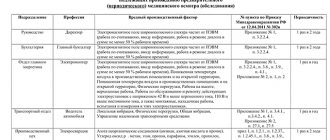What is an effective contract in education
The term “effective contract” was introduced by Order of the Government of the Russian Federation dated November 26, 2012 No. 2190-r, which approved the Program for improving the remuneration system for public sector employees. An effective contract is a standard employment contract drawn up in accordance with Article 57 of the Labor Code of the Russian Federation, in which some conditions are expanded, namely:
- the employee’s responsibilities are described in as much detail as possible;
- the terms of remuneration and social support measures are regulated in detail;
- Particular emphasis is placed on the indicators and criteria for assessing the effectiveness of teachers in order to assign incentive payments to them depending on the results of their work.
According to officials, the transition to a new wage system in an educational institution will ensure a decent level of salaries for teachers. This determines the connection between its size and the volume, intensity and quality of work performed. Also, the approved indicators must be correlated with the performance indicators of the entire educational organization, which, in turn, must implement the following actions:
Final provisions
1.1. This employment contract regulates the labor relations of the General Education Institution and the teacher [subject taught].
1.2. In order to verify the Employee’s suitability for the position he holds, he is given a probationary period of [specify period].
1.3. The decisions of the highest governing body of the Educational Institution are binding on the Employee.
1.4. The employment contract was concluded for [the duration of the employment contract is determined by the charter of the educational institution or by agreement of the parties].
1.5. The employee must begin work on [day, month, year].
1.6. Work for the Employer is the main place of work for the Employee.
7.1. Disputes between the Parties arising during the execution of this employment contract are considered in the manner established by the Labor Code of the Russian Federation and other federal laws.
7.2. In all other respects that are not provided for in this employment contract, the Parties are guided by the legislation of the Russian Federation governing labor relations.
7.3. The employment contract is concluded in writing, drawn up in two copies, each of which has equal legal force. All changes and additions to this employment contract are formalized by a bilateral written agreement.
Normative base
The introduction of an effective contract is defined:
- By Decree of the President of the Russian Federation dated 05/07/2012 No. 597.
- State program “Development of Education” for 2013-2020, approved by Order of the Government of the Russian Federation dated May 15, 2013 No. 792-r.
- The program for the gradual improvement of the remuneration system in state (municipal) institutions for 2012-2018, approved by Order of the Government of the Russian Federation of November 26, 2012 No. 2190-r.
- By Order of the Ministry of Labor of Russia No. 167n dated April 26, 2013.
- Letter of the Ministry of Education and Science of Russia dated June 20, 2013 No. AP-1073/02, which contains information on performance indicators in educational institutions.
- Indicators of the performance of subordinate state and municipal educational institutions, approved by local government bodies.
Regulatory support for the transition of educational institutions to an effective contract
An effective contract is an employment contract with an employee in which:
- his job responsibilities are specified,
- terms of remuneration,
- indicators and criteria for assessing the effectiveness of activities for assigning incentive payments depending on the results of work and the quality of government (municipal) services provided,
- as well as social support measures.
This definition of an effective contract is given in the Program for the gradual improvement of the remuneration system in state (municipal) institutions for 2012 - 2021, approved by Order of the Government of the Russian Federation of November 26, 2012 No. 2190-r.
An effective contract in the State Program of the Russian Federation “Development of Education” for 2013 - 2021
The State Program of the Russian Federation “Development of Education” for 2013 - 2020 provides a general description of an effective contract.
An effective contract in the Program means labor relations between an employer (state or municipal institution) and employees based on:
- the institution has a state (municipal) assignment and performance targets approved by the founder;
- a system for assessing the performance of employees of institutions (a set of indicators and criteria that allow assessing the amount of labor expended and its quality), approved by the employer in the prescribed manner;
- a remuneration system that takes into account differences in the complexity of the work performed, as well as the quantity and quality of labor expended, approved by the employer in the prescribed manner; the labor standardization system for employees of the institution, approved by the employer;
- detailed specification, taking into account industry specifics in employment contracts, of the job responsibilities of employees, indicators and criteria for assessing labor, and terms of remuneration.
Labor relations between the employer and employees, including the setting of wages, are formalized when concluding employment contracts.
Thus, a legally effective contract:
- This is a detailed employment contract with the employee.
However, the main meaning of an effective contract is not legal:
- and economic and managerial, and
- it consists in creating mutually beneficial conditions for the parties to the employment contract.
For a long time, there was a situation where low wages provoked workers to look for all sorts of ways to earn extra money, from which the main job suffered; employers could not achieve the fulfillment of job responsibilities, except for classroom work hours that directly affected wages.
To solve this problem, the idea of an effective contract was formulated:
- situations where the employer pays the employee a decent wage,
- and the employee works effectively, with full dedication at his main job, and this concentration of effort gives the result of his work.
This is exactly how the idea of an effective contract can be formulated – decent payment for high-quality, productive work.
An effective contract for a teaching worker:
- must provide a level of salary for teaching staff that is competitive with other sectors of the economy;
- the specific amount of wages is linked to the volume, intensity and quality of work performed under the employment contract;
- The indicators assigned to the teaching staff must be linked to the indicators of the educational institution.
Decree of the President of the Russian Federation dated May 7, 2012 No. 597 “On measures for the implementation of state social policy” ordered the Government of the Russian Federation to ensure an increase in real wages by 1.4-1.5 times by 2021, bringing the average wage to 2018 teachers and industrial training masters of educational institutions of vocational education up to the average salary in the corresponding region.
The implementation of this Decree was one of the aspects of the introduction of an effective contract with teaching staff.
An effective contract in the Program for the gradual improvement of the remuneration system, approved by Decree of the Government of the Russian Federation of November 26, 2012 No. 2190-r
The program for the gradual improvement of the remuneration system, approved by Decree of the Government of the Russian Federation of November 26, 2012 No. 2190-r, provides for the following principles and elements of an effective contract:
- in the employment contract with each teaching staff, job responsibilities, performance indicators and criteria, the amount of remuneration, the amount of incentives for achieving collective labor results, and ensuring transparency of remuneration must be clarified and specified;
- the conditions for receiving remuneration must be clear to the educational institution and the teaching staff and not allow for double interpretation;
- indicators and criteria must be measurable.
Effective contract and labor standards for teaching staff
An effective contract involves establishing labor standards.
Currently, there is no de facto standardization of labor for teaching staff in general education:
- only norms for lesson duration and estimated norms for hours of educational (teaching) work at the wage rate are not established, but do not establish the actual amount of wages;
- Such labor standards serve to calculate wages, but not to standardize the work of teaching staff.
The program for gradual improvement of the remuneration system focuses on increasing the efficiency of each teaching worker, educational institution, and educational industry, and on further improving the existing remuneration systems for teaching staff.
In the field of education, the concept of efficiency requires further adjustment. Efficiency as an economic category, as a rule, is the ratio of useful results to expended resources, which implies the achievement of a higher result relative to costs, i.e. as well as achieving the same result at the lowest cost.
The latter is not applicable to assessing the work of teaching staff:
- who are faced with the task of improving the quality, effectiveness (productivity) of work,
- incl. with a possible increase in costs, for example, labor costs, material investments, etc.
In employment contracts concluded with teaching staff on the principles of an effective contract:
- indicators and criteria of quality (effectiveness, productivity) should be established,
- not efficiency.
Problems and risks of introducing an effective teaching contract
The introduction of an effective teaching contract is associated with problems and risks:
- At the same time, the main problem is the development of measurable indicators of the results of the work of a teacher;
- there is a risk of simulating the achievement of performance indicators, which cannot be completely eliminated, the risk of introducing ill-conceived indicators, the desire to achieve which only worsens the real results of the educational process.
Since the Program for the Phased Improvement of the Remuneration System and the “Road Map” of the Russian Ministry of Education and Science provided for the phased implementation, testing and improvement of an effective contract annually until 2021:
- then, in order to work out the content and terms of employment contracts on the principles of an effective contract, as well as local acts on remuneration, the necessary temporary opportunities were provided;
- At the same time, at the present time it cannot be stated that the principles and provisions of the Program for the gradual improvement of the system of remuneration for teaching staff have found their full, meaningful embodiment in the activities of each educational institution.
In addition, the remuneration system for teaching staff represents a field for continuous improvement, taking into account the circumstances of the educational institution. Therefore, despite the fact that 2021 is already in the past, the provisions of the Program for the Phased Improvement of the Remuneration System remain relevant today.
The educational institution is faced with multifaceted tasks:
- refusal of counterproductive incentive payments to teaching staff for indicators that are general and formal in nature, such as “fair performance of work duties” and replacing them with indicators that have specific measurable parameters;
- exclusions from the number of incentive payments to teaching staff, which were actually used as a guaranteed part of the teaching staff's salary;
- ensuring optimal distribution of the wage fund from the point of view of labor remuneration principles:
for the guaranteed part - payment for the position and
- the incentive part is payment for achieving indicators of quality, effectiveness, efficiency, i.e. ensuring fair differentiation in wages.
An effective teaching contract involves:
- establishing labor standards for teaching staff in local acts of an educational institution,
- as well as the definition in local acts and in the employment contract of the actual content and scope of labor functions of each teaching employee.
Such rationing of the work of teaching staff makes it possible to accurately divide the guaranteed and incentive parts of the salary of each teaching worker.
Changes to employment contracts necessary to improve the effective contract of a teaching employee can be made in the manner established by Article 74 of the Labor Code of the Russian Federation:
- changes in the conditions of remuneration for a teaching worker are recognized as a change in the conditions determined by the parties to the employment contract in connection with organizational and (or) technological changes in labor by decision of the educational institution,
- those. actually unilaterally at the initiative of the educational institution, and is carried out with prior notification of the teaching staff in writing at least 2 months in advance.
Article 74 “Changing the terms of an employment contract determined by the parties for reasons related to changes in organizational or technological working conditions” of the Labor Code of the Russian Federation
If the teaching staff refuses to continue working under the proposed conditions:
- the employment contract with him is terminated under paragraph 7 of Article 77 “General grounds for termination of an employment contract” of the Labor Code of the Russian Federation
- with payment of 2 weeks of severance pay under Article 178 “Severance pay” of the Labor Code.
Costs of introducing an effective teaching contract
The introduction of an effective teaching contract entails certain costs:
- caused by the need to regularly assess the achievement of quality indicators, effectiveness and efficiency of each teaching staff;
- these costs can be minimized by introducing automatic assessment through the use of electronic technology with an appropriate computer program.
The risk of introducing an effective teaching contract:
- is the risk of formally performing this action;
- in this case, the volume of documentation will inevitably increase, complicating both the conduct of personnel work and, purely technically, making it more difficult to change employment contracts in the future;
- real changes may not occur.
At the same time, the instrument of an effective contract for teaching staff can be used to
- build a unified system of requirements for the personnel of an educational institution, arising from the requirements for the activities of the educational institution itself, recorded in the federal state educational standards (FSES), in road maps, state and municipal assignments, development programs and other similar documents.
If an effective contract for a teaching employee is developed based on real requirements for the quality of work of an educational institution, which will be translated in the form of requirements for job responsibilities, for the quality of work and for the qualifications of specific employees:
- the texts of employment contracts with teaching staff will become more detailed and will facilitate management work in an educational institution,
- will work to achieve its goals.
If such work is not carried out:
- an effective contract will simply increase the amount of text in the employment contract,
- without any positive effects from this increase.
If you have any questions about the violation of your rights, or you find yourself in a difficult life situation, then an online duty lawyer is ready to advise you on this issue for free.
RIGHTS OF TEACHING WORKERS
Incentives and compensation payments
Based on the content of the regulations governing the new wage system, an effective contract should provide for the following types of incentive payments and compensation:
| Compensatory payments | Incentive payments |
| For intensity and high performance results | Work in difficult climatic conditions (Far North, desert, high mountain areas, etc.) |
| For the quality of work performed | Working under conditions different from those specified in the contract (for example, replacing an absent colleague, working at night) |
| For continuous experience | Working with information constituting state secrets |
| Bonuses based on work results (for a month, half a year, a year) | Carrying out a responsible state or municipal task |
What rights do employees have?
The teacher must be informed about the upcoming changes 2 months before the introduction of the new form of calculating additional salaries in order to familiarize themselves with the new rules and make a decision.
What should be contained in a warning to the teacher:
- reasons according to which the transfer to a new type of work assessment will occur
- innovation date
- consequences of agreement and disagreement with new work rules
Actions in case of refusal of innovations
The notice must be given to each teacher against signature. The teacher may agree with the innovations, or may refuse to sign the new agreement. In Art. 72 of the Labor Code says that changing working conditions is possible if the parties have come to a common decision. Without the consent of the teacher, the director cannot transfer him to work according to the new rules.
When transferred to an effective contract, the teacher has the right to demand that his rights are not limited and the level of his guaranteed salary is not reduced. This is stated in Art. 9 TK.
If all legal norms are met, and the employee still refuses to sign an additional agreement to the contract, he may be fired from his job. But before this, the employer is obliged to offer the person another job within his organization. This procedure is prescribed in Art. 74 TK.
If there is no vacant job and the employee refuses to sign a new agreement, he may be fired under Art. 77 Labor Code of the Russian Federation. If an employee believes that his rights have been violated, he can file an application in court.
Completing an Effective Contract
The contract and additional agreement must include the following:
- Place of work. If the teacher works in a branch, representative office or other separate unit, you should first indicate the address of the institution, and then the name of the unit with its location.
- Labor function (indicating qualifications, position and specialty).
- Terms of remuneration. This paragraph should regulate the procedure for paying salaries, as well as incentive and compensation payments. To do this, it is necessary to specify the conditions for their receipt, as well as indicators and criteria for assessing effectiveness, frequency and size.
- Work and rest schedule.
- Duration of annual paid leave.
- Social support measures.
- Other conditions determined by the specifics of the educational institution.
An effective contract in education can be found at the end of the article.
Features and pitfalls
First, let's figure out what is the fundamental difference between an effective contract and an employment contract?
The main difference is the specification of job responsibilities in an effective contract and different types of payments in addition to salary in relation to a specific employee.
The main changes also concern how incentive payments are determined. The difference lies in the level of detail in how incentive payments are written.
Also fundamentally new is the inclusion of the wording “criteria and performance indicators” in an effective contract. Changes in indicators and criteria for assessing the performance of employees cannot be attributed to changes in organizational or technological working conditions. Therefore, the detail of such indicators should be reasonable, and the contract should only include payments that will be regular and stable in accordance with the specified criteria.
Basic nuances.
The undoubted advantages for employees are: • improved remuneration; • formation of the wage fund in the organization; • independent formation of the organization’s staffing table, taking into account the amount of funds received; • introduction of incentives for achieving results and improving the quality of work; • a detailed understanding by the employee of his work function.
But an effective contract, like any innovation, also has some disadvantages: • incorrect definition of performance indicators or criteria for their evaluation, which can lead to ineffectiveness of the entire system as a whole; • additional time spent on developing performance criteria and a system for assessing the quality of work; • the transition to NSOT may lead to insufficient funds in the Payroll Fund, since incentive payments are often not taken into account.
What problems might arise?
Firstly, untimely development of criteria and performance indicators and the hasty conclusion of an effective contract can lead to the employee’s unlawful performance of his functions. Also, performance criteria that the employee was not familiarized with in a timely manner may serve as a factor in depriving him of additional payments.
To determine the effectiveness of an employee’s work, a system of quantitative indicators is needed that will take into account specific types of work and labor costs. Such a system must have a clear counting algorithm.
Algorithm of actions
When switching to a new payment system, the employer must go through the following stages:
- Employees should carefully review the legal and regulatory framework.
- Heads of municipal organizations with authority in the field of education must develop performance indicators for supervised organizations.
- An educational institution must develop its own performance criteria and make appropriate changes to the Regulations on remuneration.
- The HR department develops the form of agreements (contracts) and additional agreements, taking into account Appendix No. 3 to Program No. 2190-r and Recommendations No. 167n.
- The manager issues an order to switch to an effective contract.
- The staff gets acquainted with innovations.
- The employer enters into additional agreements with employees.
Sample of an effective contract in education
What are the goals of the innovation?
The main goal of transferring teachers to a new form of job evaluation is to increase their salaries. The higher the work efficiency, the more money teachers should receive. The innovation should ensure decent wages for teachers and raise the prestige of their profession. Changes in the bonus system will increase the qualifications of employees and improve the quality of their services.
The state has approved only an approximate form of the new agreement. Each institution can develop its own version of the contract.
All personnel of a particular organization, including the administration, must switch to a new type of job evaluation. An effective contract differs from an existing employment contract by a more detailed description of all types of incentives.
Pros and cons of the transition
The innovation in the field of assessing the work of teachers in accordance with the new Resolutions of the Russian Government is liberal and gives complete freedom of action to the administration of educational organizations. Despite the simplicity of the wording and scoring system, it is not always possible to track whether teachers are paid correctly. This is a big disadvantage of the new contract.
Student success indicates high work efficiency
High achievements of students, victories in competitions and olympiads can go unnoticed for some teachers and well paid for others. Members of the teaching staff do not know what the salaries of their employees are.
If the administration underpays someone, citing problems with funding from the local budget (which is often true), then it is impossible to find out how other teachers are doing with their earnings. Some teachers, instead of doing real work at the end of the month, simply make up reports. Salaries are sometimes awarded for a fascinatingly designed report about fictitious achievements, excursions, meetings, meetings.
Teachers, in the old fashioned way, try to get a bigger salary by taking on additional workload. In educational organizations, work is always paid according to the methodology approved by the Ministry of Education. Not all teachers succeed in achieving fair assessment of higher-quality work.
However, the innovation also has its advantages. Teachers have become more enterprising; they pay more attention to extracurricular activities and active recreation for students. The level of students' knowledge has increased significantly. Students master subjects better and study more willingly. Teachers understand that their salaries ultimately depend on how many points their students score in exams. Teachers try to instill in their students a love of knowledge in every way.
The main problem when transferring teaching staff to a new contract is insufficient funding from local budgets and the opacity of calculating additional salaries.
The staff of educational organizations is often reduced, trying to invest in the budget, and sometimes in order to increase the earnings of remaining teachers and administrators. To prevent this from happening, it is necessary to develop a mechanism for distributing budget funds for education as a percentage of local budget revenues. Information about additional types of income for teachers should be open to all members of the team.
An effective contract is a document that rewards each teacher for additional work with students and high results in their work. Moreover, the incentive is expressed in monetary form and significantly increases the wages of employees.
Top
Write your question in the form below










